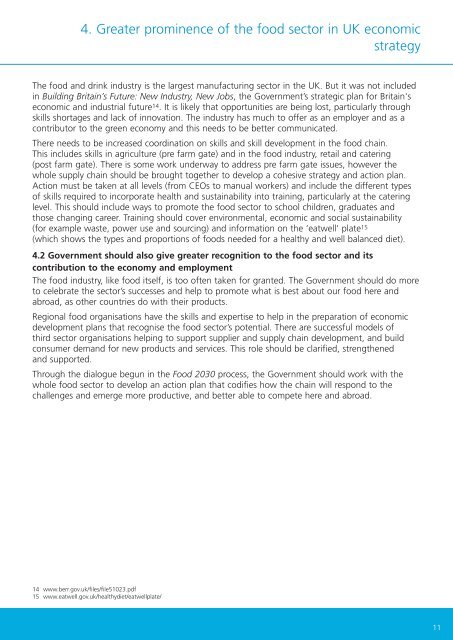Food: a recipe for a healthy, sustainable and successful future
Food: a recipe for a healthy, sustainable and successful future
Food: a recipe for a healthy, sustainable and successful future
Create successful ePaper yourself
Turn your PDF publications into a flip-book with our unique Google optimized e-Paper software.
4. Greater prominence of the food sector in UK economic<br />
strategy<br />
The food <strong>and</strong> drink industry is the largest manufacturing sector in the UK. But it was not included<br />
in Building Britain’s Future: New Industry, New Jobs, the Government’s strategic plan <strong>for</strong> Britain's<br />
economic <strong>and</strong> industrial <strong>future</strong> 14 . It is likely that opportunities are being lost, particularly through<br />
skills shortages <strong>and</strong> lack of innovation. The industry has much to offer as an employer <strong>and</strong> as a<br />
contributor to the green economy <strong>and</strong> this needs to be better communicated.<br />
There needs to be increased coordination on skills <strong>and</strong> skill development in the food chain.<br />
This includes skills in agriculture (pre farm gate) <strong>and</strong> in the food industry, retail <strong>and</strong> catering<br />
(post farm gate). There is some work underway to address pre farm gate issues, however the<br />
whole supply chain should be brought together to develop a cohesive strategy <strong>and</strong> action plan.<br />
Action must be taken at all levels (from CEOs to manual workers) <strong>and</strong> include the different types<br />
of skills required to incorporate health <strong>and</strong> sustainability into training, particularly at the catering<br />
level. This should include ways to promote the food sector to school children, graduates <strong>and</strong><br />
those changing career. Training should cover environmental, economic <strong>and</strong> social sustainability<br />
(<strong>for</strong> example waste, power use <strong>and</strong> sourcing) <strong>and</strong> in<strong>for</strong>mation on the ‘eatwell’ plate 15<br />
(which shows the types <strong>and</strong> proportions of foods needed <strong>for</strong> a <strong>healthy</strong> <strong>and</strong> well balanced diet).<br />
4.2 Government should also give greater recognition to the food sector <strong>and</strong> its<br />
contribution to the economy <strong>and</strong> employment<br />
The food industry, like food itself, is too often taken <strong>for</strong> granted. The Government should do more<br />
to celebrate the sector’s successes <strong>and</strong> help to promote what is best about our food here <strong>and</strong><br />
abroad, as other countries do with their products.<br />
Regional food organisations have the skills <strong>and</strong> expertise to help in the preparation of economic<br />
development plans that recognise the food sector’s potential. There are <strong>successful</strong> models of<br />
third sector organisations helping to support supplier <strong>and</strong> supply chain development, <strong>and</strong> build<br />
consumer dem<strong>and</strong> <strong>for</strong> new products <strong>and</strong> services. This role should be clarified, strengthened<br />
<strong>and</strong> supported.<br />
Through the dialogue begun in the <strong>Food</strong> 2030 process, the Government should work with the<br />
whole food sector to develop an action plan that codifies how the chain will respond to the<br />
challenges <strong>and</strong> emerge more productive, <strong>and</strong> better able to compete here <strong>and</strong> abroad.<br />
14 www.berr.gov.uk/files/file51023.pdf<br />
15 www.eatwell.gov.uk/<strong>healthy</strong>diet/eatwellplate/<br />
11








